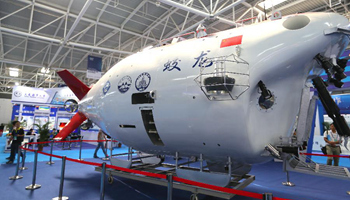UNIETD NATIONS, Sept. 26 (Xinhua) -- UN Secretary-General Ban Ki-moon on Monday called for a full global disarmament as the world faces growing nuclear dangers and tensions, but progress in multilateral nuclear disarmament has come to a "standstill."
"Let us pledge to work for the total elimination of nuclear weapons with urgency and a sense of collective purpose. Our very survival depends upon it," Ban said in his message to mark the International Day for the Total Elimination of Nuclear Weapons, which is observed annually on Sept. 26.
Noting that nuclear disarmament is one of the founding principles of the world body, he said that it was also the objective of the first UN General Assembly resolution.
"Disarmament is in our DNA," the secretary-general said, adding that he has been proud to advance the goal of a world free of nuclear weapons, such as by launching, in 2008, a Five Point Proposal on Nuclear Disarmament to spur member states to greater action.
"Sadly, many countries continue to include nuclear deterrence in their security doctrines. But recent developments have shown that nuclear weapons do not ensure peace and security. Rather, their development and possession has become a major source of international tension," the UN chief said.
"As we scan the global horizon, we face growing nuclear dangers. Progress in multilateral nuclear disarmament has come to a standstill," he added.
There are growing divisions on the future of multilateral nuclear disarmament. The next review cycle of the Treaty on the Non-Proliferation of Nuclear Weapons begins in 2017, and "the world cannot afford another round of inaction," Ban said.
A landmark international treaty opened for signature in 1968, the Treaty on the Non-Proliferation of Nuclear Weapons entered into force in 1970, and was extended indefinitely on May 11, 1995.
Its objective is to prevent the spread of nuclear weapons and weapons technology, promote cooperation in the peaceful uses of nuclear energy, and further the goal of achieving nuclear disarmament and general and complete disarmament. It represents the only binding commitment in a multilateral treaty to the goal of disarmament by the nuclear-weapon States.
The International Day for the Total Elimination of Nuclear Weapons was established by the UN General Assembly in 2013 in a resolution calling for the "urgent commencement of negotiations in the Conference on Disarmament of a comprehensive convention on nuclear weapons to prohibit their possession, development, production, acquisition, testing, stockpiling, transfer and use or threat of use, and to provide for their destruction."










